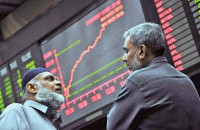Reciprocal tariffs: a seismic shift in global trading system
To mitigate impact of levies, Pakistan must invite Chinese industries to relocate under CPEC phase-II

Uncertainty has prevailed all over the world and it may foment more protectionism and economic unrest, while sparking calls for a new economic order as US President Donald Trump's reciprocal tariffs have produced a seismic shift in the global trading and economic system.
The imposition of 29% tariffs on Pakistan vividly reflects the rapidly changing socio-economic, geopolitical and geo-strategic priorities of the US tilted towards India.
It has significantly affected Pakistan's trade competitiveness and will hit its export sector hard, particularly the already stagnant textile industry, as well as dent foreign reserves, and employment, further exacerbating the country's economic challenges. Apart from textile, footwear, food, steel, lighter electric cables, cement, and sports goods sectors would also be in the line of fire.
The best strategy to mitigate the impact of US tariffs is to invite and encourage the relocation of Chinese qualitative industries under the flagship China-Pakistan Economic Corridor (CPEC) phase-II, establish the long planned Special Economic Zones, re-adjust the trading equation, promote joint ventures in textiles, garments, small and medium-sized enterprises, other industries, e-commerce, science and space, robotics, hybrid agriculture and above all artificial intelligence between the two countries.
The US has not completely abandoned free trade, but it has moved towards more protectionist policies, including withdrawing from the Trans-Pacific Partnership and imposing tariffs on certain goods. Interestingly, the US has historically been a proponent of free trade, participating in numerous trade agreements and advocating for open markets. Now, it seems to have built a walled America with a self-desired isolation and self-devised deep economic protectionism over fears that the countries facing retaliatory tariffs will further quarantine it. Thus, de-globalisation and the re-rise to regionalism are gaining momentum on the spur of the moment. Nevertheless, Trump's notable exclusions of the import of steel, aluminium, automobiles and temporarily sparing copper, pharmaceuticals, semiconductors and lumber, alongside certain critical minerals and energy products and geopolitical manoeuvring to delay additional duties on South Korea, Japan, Canada and Mexico clearly demonstrate some vital economic wisdom for survival.
Numerous estimates of the IMF, the US Federal Reserve, Fitch Ratings, JP Morgan and prominent think tanks indicate that the US economy may face recession/stagflation during September-October 2025. It is estimated that Trump's tariffs will add as much as 1.5% to the already rising prices this year, according to the core personal consumption expenditures (PCE) index, which will hit personal incomes and consumer spending.
Owing to the complex global supply chains and their interdependence, if Trump's new tariffs send other top economies into recession, the fallout for US economic growth and industrial expansion could be devastating. Moreover, the recent US policy shifts suggest a rising risk of stagflation in the country due to uncertainty about growth prospects and the cost of living, exacerbated by the erratic and aggressive tariff policy. The trade war is heating up and turning into a mighty one. China seems determined and confident as the world's biggest importer, the US, which is called the land of opportunities, has also imposed tariffs on the world's biggest exporter. While Trump's aims are unclear, he is striving to get some concessions from the trading partners. He has raised tariffs on all countries, while focusing more on Asia and taking the US economic policy back to the 19th century.
On April 2, Trump unveiled that he would impose 10% levies on all imports with higher reciprocal tariffs. He believes that the world's wealthiest country is a victim of unfair treatment in trade. His moves evoked strong reactions from world's leaders including European Commission President Ursula von der Leyen, Australian Prime Minister Anthony Albanese, Japanese and other government officials. On top of that, China has also quickly responded.Regional expert and Centre for South Asia and International Studies Islamabad Executive Director Dr Mehmoodul Hassan Khan said undoubtedly, China's economy has been open, its policies are supportive and its laws are transparent, guaranteeing inflows of foreign direct investment. It has become the biggest trading partner of more than 150 countries, which shows its increasing role in the global economy, trading system, manufacturing capacity and good governance.
Its more than 33% contribution to the global economy has catalyzed its economic diversification and sustained economic growth. Chinese policymakers have shifted their focus to further diversification of export destinations, emphasising the importance of new markets, new economic drivers, new economic model (double circulation), trading partners (Latin America, Southeast Asia, Central Asia, Africa and the EU), re-energising the China-Japan-South Korea Free Trade Agreement, greater trans-regional connectivity with Indonesia, Malaysia, Vietnam, Thailand, and Asia-Pacific Economic Cooperation (APEC), Regional Comprehensive Economic Partnership (RCEP), BRICS and Shanghai Cooperation Organisation (SCO). Khan said, "It is indeed an ill-planned attack on the 'Asian Century' which would be self-defeating, devastating and dangerous for the US economy, community and industries alike."
He said the 2024 Kearney FDI Confidence Index, published by the American global management consulting firm Kearney, showed that China jumped from the seventh to third position. Among emerging markets, China ranks first. This year, entrepreneurs from Europe, Asia, South America, and the US have actively come to China to discuss cooperation. This is the mainstream voice in the international community for cooperative development. Opening-up brings progress, and cooperation leads to a win-win outcome, which has repeatedly proved China's openness and global contribution. Countries and trade blocs are nowadays striving hard to form a new order, while relinquishing the older one, relying less on the US and safeguarding from Chinese overcapacity and oversupply. A flash of hope has appeared as an open market bloc may reshape a trade order from the relics of Trump's trade war.
The writer is a staff correspondent






















COMMENTS
Comments are moderated and generally will be posted if they are on-topic and not abusive.
For more information, please see our Comments FAQ